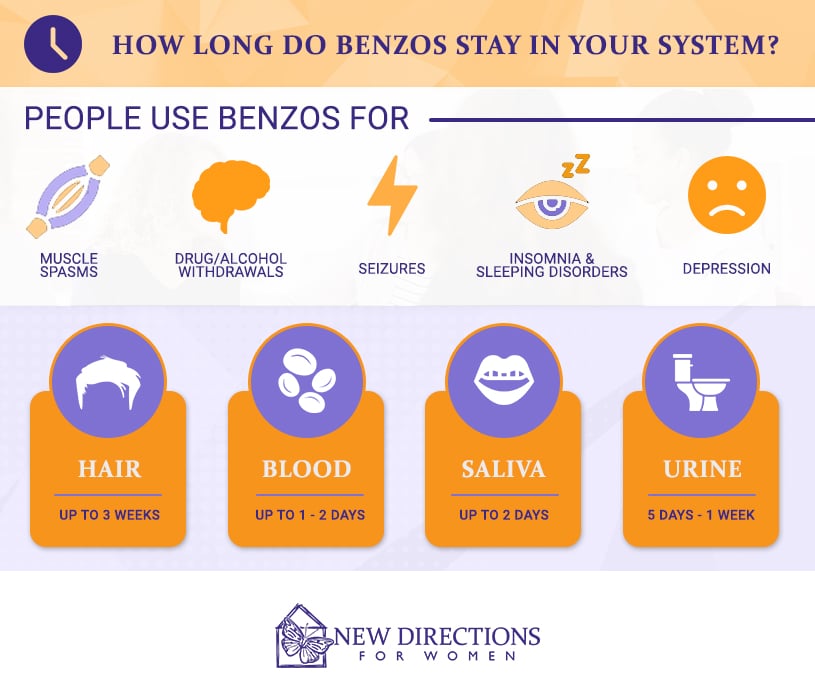So, you’re wondering what the answer is to the question: how long do benzos stay in your system. How long benzos stay in your system depends on a lot of different factors. For example, the type of benzo ingested determines its duration of action and its half-life, which is the time it takes for 50% of a compound to break down.
These aren’t the only considerations that affect how long benzos stay in your system. First, though, it’s important to know exactly what benzos are before we dive into how long they stay in your system.
What are Benzos?
The term “benzos” is short for benzodiazepines, a class of drug used to treat various conditions by depressing the central nervous system. You probably recognize the popular prescription drug that goes by the name Xanax. This medication is a widely prescribed benzodiazepine. Other popular benzos include:
- Ativan
- Valium
- Librium
- Halcion
- Restoril
- Klonopin
Benzodiazepines work by enhancing the effect of a neurotransmitter called gamma-aminobutyric acid, or GABA, to send calming messages to the body. When a person feels anxious, this chemical counters overstimulation to reduce symptoms of anxiety.
Why Do People Use Benzos?
Benzos have a wide range of uses. They are used as sedatives, muscle relaxers, or as general anesthetics. Additionally, they considered very effective at treating:
- Seizures
- Depression
- Muscle spasms
- Nausea and vomiting
- Alcohol and drug withdrawal
- Insomnia and other sleep disorders
- Panic attacks and anxiety disorders
Despite how effective they are, one must be cautious when using benzos as they are considered by medical professionals to be highly addictive. Unfortunately, their addictiveness and the effects they produce have led to benzos being one of the most widely abused types of prescription medication.
Why Do People Abuse Benzos?
As with many other prescriptions, there are many reasons why someone may abuse benzodiazepines. People who have a benzo prescription may develop a dependence on the drug over time, especially if they take more benzos than prescribed or take them more often than prescribed.
Abusing a benzo prescription can lead to symptoms of withdrawal once use is discontinued. This causes some people to seek out more benzos, in a cycle of addiction, to ward off the uncomfortable symptoms such as:
- Nausea
- Stiffness
- Sweating
- Irritability
- Headaches
- Panic attacks
- Muscular pain
- Muscle tremor
- Heart palpitations
- Sleep disturbance
- Perceptual changes
- Difficulty concentrating
- Increased tension and anxiety
Benzo abuse also occurs as a result of people wanting to feel “high.” Xanax, also referred to as “bars,” is a popular party drug. This is highly concerning because Xanax can be fatal when mixed with other substances, especially opioids and alcohol.
How Long Do the Effects of Xanax Last?
 If you’re being prescribed Xanax, you may be wondering how long do the effects of Xanax last? How long the effects last depends on the dosage. In general, Xanax starts to take effect within an hour of ingestion. The fast-acting nature of the drug is why many misuse it. The euphoric feelings that Xanax produces are highly desirable and wane as tolerance builds. This is where benzo abuse can start as people start to take more than prescribed to reach the desired effect.
If you’re being prescribed Xanax, you may be wondering how long do the effects of Xanax last? How long the effects last depends on the dosage. In general, Xanax starts to take effect within an hour of ingestion. The fast-acting nature of the drug is why many misuse it. The euphoric feelings that Xanax produces are highly desirable and wane as tolerance builds. This is where benzo abuse can start as people start to take more than prescribed to reach the desired effect.
Benzos and The Risk of Overdose
The human body builds a tolerance to benzos relatively quickly. Additionally, the calm, relaxing effect of these drugs increases their abuse potential. When people are prescribed benzos, doctors usually prescribe the lowest dose to lessen the risk of abuse. Despite their efforts, misuse of benzos is a possibility.
If you’re wondering how long benzos stay in your system, you may be currently taking a prescription benzodiazepine. While being prescribed benzos, it’s important to only take the amount prescribed by your doctor. It is also imperative to avoid cutting or crushing benzos as this is highly dangerous and can lead to overdose. Symptoms of an overdose include:
- Coma
- Confusion
- Drowsiness
- Clammy skin
- Dilated pupils
- Shallow respiration
- Weak and rapid pulse
If you believe that someone close to you is exhibiting signs of an overdose, call 911 or poison control immediately. While not everyone dies from an overdose, overdoses can result in life-threatening reactions that medical professionals can mitigate.
 How Long do Benzos Stay in Your System?
How Long do Benzos Stay in Your System?
There is no one answer for the question of “how long do benzos stay in your system”. Many different genetic and external considerations affect how long a given substance stays in any person’s body. The amount of time it takes to eliminate these drugs depends on factors such as:
- Age: A person’s age may cause their body to eliminate benzos at a slower rate. For example, the half-life of Xanax increases from 11 hours to 16 hours in seniors versus in healthy young adults.
- Weight: Higher concentrations of body fat are linked with a longer drug half-life. For adults who are overweight, benzos usually take longer to leave the body.
- Other Medications: The presence of other medications or substances can affect how quickly or slowly benzos are eliminated from the body. Cigarette smokers are found to possess a smaller concentration of benzos in their bodies over time compared to non-smokers. On the other hand, mixing benzos and alcohol leads to a lengthened drug elimination process.
- Medical conditions: Certain medical conditions prevent the body from eliminating benzos easily. For example, people with chronic liver disease are unable to break down drugs at the same rate as adults without a chronic illness.
- Lifestyle: Your lifestyle can affect the speed at which benzos are broken down by the body. Adults with a more active lifestyle and subsequent higher metabolism excrete substances much quicker than inactive adults.
Some tests are only able to detect benzos in your system for a few days, while others may be able to find traces of benzos months after the last dose was taken. If you’re wondering how long do benzos stay in your system, you may also want to know the answer to the following questions:
How Long Do Benzos Stay in Urine?
Commonly used during the employment process, urine drug screenings can detect present and past drug use. Benzos, in particular, can be found in urine for 5 days and up to a week after the last dose is taken. Depending on metabolic factors, age, weight, or alcohol consumption, this time frame may be longer.
How Long Do Benzos Stay in Blood?
Blood tests are generally used to see if any drugs are in a person’s system presently. These are usually conducted in a medical setting and after incidents such as an overdose.
How Long Do Benzos Stay in Hair?
The detection time of certain drugs is the longest in hair. While not the most common method of testing, benzos can be found in hair 2 to 3 weeks after a dose. A person can also test positive for benzos up to 90 days after their last dose.
How Long Do Benzos Stay in Saliva?
Saliva collected for oral fluid lab testing can detect whether a person has taken any substances fairly recently. For benzos, this means being traceable for 2.5 days after the last dose.
Getting Treatment for Benzo Abuse
Admitting that substance use has crossed the threshold and become substance abuse is difficult. This is the first step in taking your life back from the clutches of addiction, though. If you find yourself experiencing withdrawal when discontinuing the use of benzos or find yourself unable to stop taking benzos, help is available.
If you are experiencing the following symptoms, it’s time to seek treatment for a benzo addiction:
- Blacking out
- Mood changes
- Inability to stop
- “Doctor shopping”
- Impaired coordination
- Asking others for their pills
- Engaging in risky behaviors
- Mixing benzos and other drugs
The Types of Treatment Available
Treatment for benzodiazepine addiction provides a safe place to detox and recover from addiction. Different therapies, counseling, education, and skill-building are provided in these programs to facilitate a recovery process that leads to a benzo-free life. The treatments available include:
- Medical Detox: Detox is often the first step in benzo addiction treatment. Quitting prescription medication use cold turkey can be dangerous. With medical detox, patients are tapered off of the substance they are abusing in a safe controlled environment.
- Inpatient treatment: Inpatient treatment provides patients with a supportive and sober environment where they can attend therapy and educational sessions that lead to a drug-free future. This type of treatment is a great option for patients who need 24/7 care due to a more severe addiction or dual diagnosis.
- Outpatient treatment: Outpatient treatment works well for patients who have a supportive and sober home environment. For patients with a less severe addiction to benzos, this treatment allows them to return home every day to practice their new skills and coping mechanisms.
- Relapse prevention support: Treatment may end, but the road to recovery is a life-long journey. With relapse prevention support, patients are given the tools they need to stay sober.
The different treatment options available reflect the complexity of addiction. Everyone experiences substance abuse disorders differently. It’s important to discuss the circumstances around addiction as well as any other accompanying mental health disorders with a treatment professional to build a treatment plan that is as effective as possible.
Overcome Benzo Abuse Here At New Directions for Women
An addiction to a prescription benzodiazepine may not seem serious but must be treated with the utmost care and concern. This is especially true for women who are prescribed benzos to treat the symptoms of a mental illness or anxiety disorder. An addiction can transform a useful medication into something that makes a mental illness worse.
The effects of addiction on a person’s life, relationships, and body require specialized treatment to ensure a safe and effective recovery. If you or a woman close to you is abusing benzodiazepines, our treatment experts can help you decide what treatment plan is best for your unique needs. Recovery looks different for everyone. Reach out to us today to discuss the recovery plan that works best for you.












